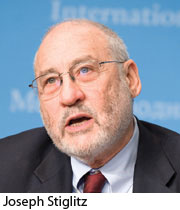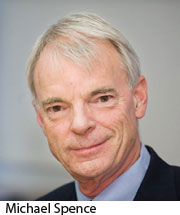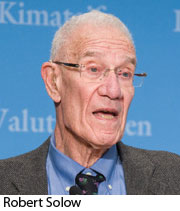Rethinking Economics in a Changed World
Finance & Development, June 2011, Vol. 48, No. 2
Watch video: Michael Spence
Watch video: Joseph Stiglitz
Watch video: Robert Solow
Three Nobel laureates discuss what the crisis has taught us
TWO AND A HALF years after the collapse of Lehman Brothers triggered the worst global financial crisis since the 1930s, some of the biggest names in economics came together at the invitation of the IMF to discuss what we have learned—and what we need to do differently.
The crisis was a wake-up call for theorists and policymakers. Economic models and policy tools—and how they are used—must adapt to changes in the global economic and financial system.
“The crisis has clearly shown both the limits of markets and the limits of government intervention. It is time to take stock and draw a first set of lessons,” Olivier Blanchard, the IMF’s Chief Economist, told more than 300 academics, journalists, and civil society activists who recently gathered at IMF headquarters in Washington, D.C., for the conference.
F&D interviewed three Nobel laureates in economics who participated in the conference: Professor Michael Spence of Stanford University, Professor Joseph Stiglitz of Columbia University, and Robert Solow, professor emeritus at the Massachusetts Institute of Technology.
Here is what they had to say on some of the most hotly debated topics in economics today.

F&D: What lessons have we learned from the crisis?
Stiglitz: At a very high level of analysis there is a realization that markets are not necessarily efficient and stable on their own. Many economists had believed that to be the case before the crisis.
Another widespread belief was that keeping inflation low and stable was necessary, and almost sufficient, for maintaining high growth and good economic performance. Clearly, that is wrong as well.
But perhaps the most striking lesson—not so much for policy but for economic analysis—is that the models that were used before the crisis neither predicted the crisis nor gave us a framework for responding to the crisis when it happened.

So in a sense, for an economist, this is a very exciting time, because it means there’s a lot of work to be done.
F&D: How has the crisis changed the thinking on monetary policy?
Spence: My takeaway of the general discussion is that inflation continues to be an important policy target, but it can’t be the exclusive focus of central banks.
If one is worried about the stability of systems as complex as our financial systems, focusing on inflation, I think, is quite clearly not enough.

Solow: The simple dependence on conventional monetary policy, not to be abandoned of course, seems to have come to its limits, and one has to move on even to direct fiscal policy or to innovative ways of dealing with money and credit.
An interesting idea with direct policy implications is to rethink the way the credit mechanism mediates between savers and investors and puts credit to productive use. That is terribly important, both nationally and internationally.
In [the United States] right now, the credit mechanism for small or medium-sized enterprises has frozen.
Stiglitz: Before the crisis, there was, in some circles, the view that fiscal policy was not as effective as monetary policy. The only limitation to that would be when interest rates came down to zero—then monetary policy couldn’t work, and that was thought to be a weird and almost-never-to-occur circumstance.
Well, we’re now living in that very circumstance. And we’re back in a situation where, really, fiscal policy does matter.
Stiglitz on how to reform the financial system
F&D: What should be done about the financial sector?
There is a recognition that in the aftermath of the crisis we haven't really created a more stable financial system—that, to too large an extent, we're going back to where we were before the crisis. And in some ways, things are worse.
They are worse in two ways. First, we have a more concentrated banking system, especially here in the United States. And, second, the problem of moral hazard is at a heightened level. The banks know that when push comes to shove, any bank that is very big will be rescued.
So we actually have not succeeded in repairing our financial system. And the vulnerability is, in some ways, even greater. And our capacity to respond to a crisis is lessened because of the rising debt and deficits that have come as a result of the crisis itself.
The implication is that we really need to get back to work to try to design a regulatory system, including making sure that we both limit the size of the too-big-to-fail banks and level the playing field.
F&D: What would such regulation look like?Regulation should be global in nature. But if we cannot get a global agreement, it is necessary for countries to go ahead and protect themselves.
Banks have to be organized as subsidiaries, not branches, so that each government has enough control of its own banking system. It will not be a full solution, but we will move away from the single-market concept to the realization that as long as we do not have a full global regulatory system, each country has a responsibility to its own citizens and its economy.
The second important point is that cross-border flows can be very destabilizing. One of the major sources of disturbances—particularly to developing countries—are unstable, short-term capital flows, and that implies that any government wishing to try to create a more stable economy has to think very deeply about capital account management. That involves using a broad range of tools, from prudential banking regulations to exchange-rate interventions, taxes, and possibly even controls.
So we are seeing a big change in the mind-set of how we think about these cross-border flows.
F&D: Does the IMF have a role to play?
Oh, very much. The best way of doing the regulation is global. Because, in the absence of global rules, there is going to be regulatory arbitrage.
If we want to create a stable financial system, we all have to raise our standards. That, in a sense, was the biggest lesson of the crisis—that each country pursuing its own interest does not necessarily lead to the well-being of the global economy. There is, therefore, a need for this kind of coordination.
F&D: What role do you see for fiscal policy today?
Spence: I think that the fiscal situation presents risks and has to be sorted out. I imagine we’ll muddle through, but maybe we won’t and we’ll have a kind of minicrisis either in Europe or America or both.
Spence on the importance of emerging markets
F&D: What does the future hold for emerging markets?
Emerging markets responded to the crisis extremely well. They recovered faster than any of us expected and are back, for the most part, to precrisis levels of growth. And it looks like that is sustainable, even if the advanced countries are limping along.
A major downturn in Europe or North America would at least put a dent in their growth rate, but there has been partial decoupling.
This would not have been true 10 years ago. It is a function of the rising aggregate size of the emerging markets in the global economy. Their rising incomes make domestic production more interesting, and trade between emerging markets is high and rising. All these developments are increasing their ability to sustain growth on their own.
F&D: What are the main challenges facing this group of countries?
Inflation is a very important problem. The rising commodity prices are a major headache because they have a bigger impact on inflation in the developing countries and they have an adverse distributional impact. In many developing countries, poor people spend as much as 50 percent of their income on food. If you have a major increase in the price of food, the de facto effect is to reduce incomes among the most vulnerable people. That is a very important concern.
So one of the lessons of the crisis for the emerging markets is that they need to pay more attention to prebuilt mechanisms that allow them to redistribute income or provide support in the face of shocks.
The alternative is to adopt policies that are not ideal. To give you an example, during the last food price spike just before the crisis hit, India—which, along with Thailand, is one of the two largest exporters of rice in the world—imposed export controls. Now the Indians are very sophisticated and they knew perfectly well that was not the right answer. But they did not have another way to protect the poorer parts of the population from the commodity price spike.
So I think you will see these defensive measures in general are going to get a higher priority in emerging markets. They have also learned bitter lessons in the crisis in the late 1990s, and it has stood them in good stead in this round: low external debt, fiscal health for the most part, and reserves as self-insurance.
Solow: On the fiscal policy side, there is a lot of latent power. The limitations are primarily political. We have created an enormous increase in public debt in the United States: that’s pretty clear. And we are certainly not at the limits of the possibility of public debt, because the federal government at the moment doesn’t have any trouble selling its bonds.
But any aggressive fiscal policy would entail still a bigger buildup of debt, which will have to be settled in the longer run.
Stiglitz: One of the lessons that came out very strongly was that fiscal policy works—that when the economy is weak, government spending can actually stimulate the economy.
The IMF played a very constructive role in this crisis of reminding many people that what we need now is stimulation, reminding people that some of the earlier results about deficit policies were wrong. Deficit spending is what is needed. Austerity too early could bring us back into an economic downturn.
F&D: What are the prospects for reviving growth?
Spence: Growth will struggle back, but the employment problem will remain. For the first time in the postwar period—which is when the emerging economies rejoined the party—growth and employment in the advanced countries are going to diverge. So we can’t assume that employment will come back or that income distribution will go the way we want it to in the advanced countries just because growth is coming back.
The reason is that growth is going to happen in the tradable sector, in areas where advanced countries have a comparative advantage that is narrowing as various parts of those global supply chains move elsewhere. I think we are in for a period in which we have to deal separately with employment opportunities—with income distribution on the one hand and growth on the other.
Solow: The easiest way to encourage growth and employment in the United States might be to look for ways in which the government or the private financial system can be induced to extend credit to small and medium-sized businesses, which right now can’t get credit and are not expanding employment.
Solow on the importance of education
F&D: What is needed to put people back to work?
The role of education in the economic growth of middle-income and low-income countries is an important issue.
We economists tend to measure education by input, not output. We count how many years people have been in school. Instead of worrying so much about quantities of education, we ought to be thinking about the content of the education. What is it that primary school or secondary school kids in poor and middle-income countries need to know? This is not necessarily what they are being taught.
And by the way, the same holds for advanced countries and the United States. We measure our success in generating an educated population in terms of the fraction of the age group that is in college. I would be very interested in other kinds of postsecondary education that are skills-based and would equip people for the jobs that are likely to be available.
That is going to require that employers be involved in the planning of that sort of education. For the United States, and perhaps for much of the world, that is a wholly new idea.
Stiglitz: In order to recover in a robust and stable way, we have to get global growth going. And that really has to do with how the whole global system works. An important part of that is the global reserve system. Figuring out how to replace the current dollar-based system with a global system is extraordinarily important.
One approach to that is augmenting the SDR [special drawing rights] system, which the IMF manages. [The SDR is an international reserve asset created by the IMF in 1969 to supplement its member countries’ official reserves.] There are proposals now to issue SDRs on a regular basis so they may be used in a countercyclical way and for addressing global needs such as climate change and financing for developing countries. ■
Camilla Andersen is a Senior Editor on the staff of Finance & Development.



